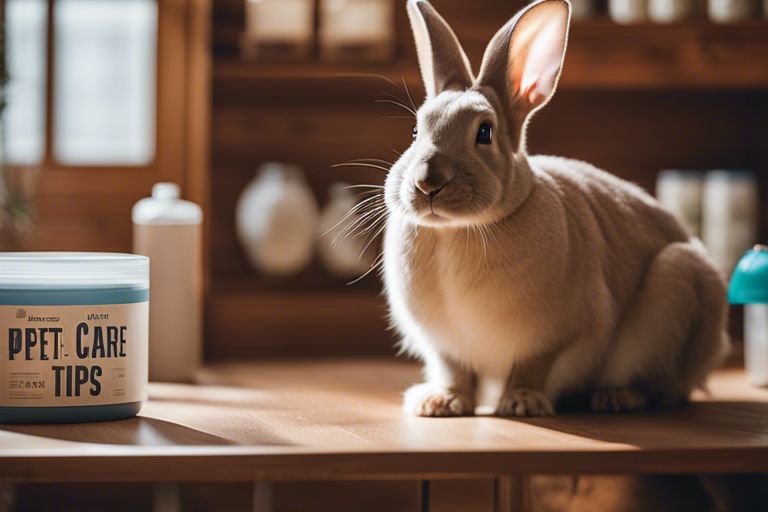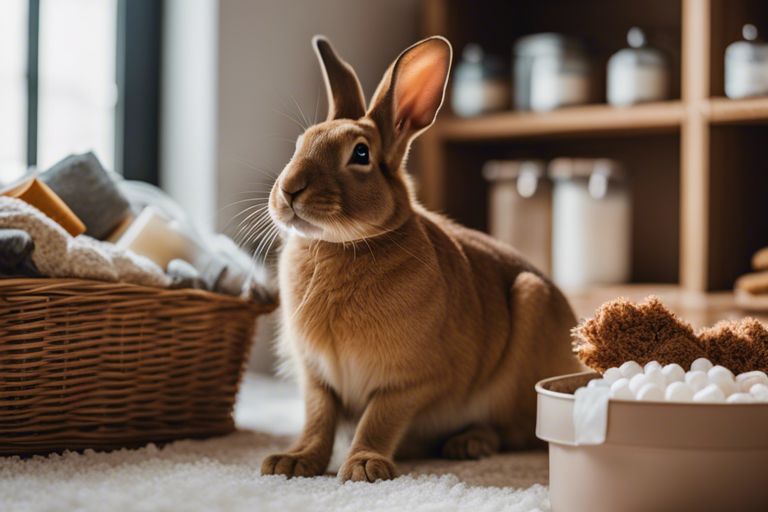It is imperative for pet owners to understand the potential risks and benefits of using flea treatments on their beloved pets, especially when it comes to large breeds such as the Flemish Giant rabbit. While these gentle giants may not be as susceptible to flea infestations as dogs or cats, it is crucial to carefully consider the dangers of untreated infestations, as well as the potential harm that certain flea treatments can pose to them. In this blog post, we will explore the factors to consider when deciding whether or not to use flea treatments on your Flemish Giant rabbit, and offer recommendations for the safest and most effective options available.
Key Takeaways:
- Fleas can be harmful to Flemish Giant rabbits: Fleas can cause irritation, anemia, and transmit diseases to your rabbit.
- Consult with a veterinarian: Before using any flea treatment on your Flemish Giant rabbit, it is important to consult with a veterinarian to ensure the safety and effectiveness of the product.
- Avoid using products intended for dogs or cats: Many flea treatments for dogs and cats can be toxic to rabbits, so it is essential to only use products specifically formulated for rabbits.
- Regular grooming and cleaning can help prevent flea infestations: Keeping your rabbit’s living area clean and grooming them regularly can help prevent flea infestations without the need for chemical treatments.
- Monitor for signs of fleas: Keep an eye out for excessive scratching, hair loss, and visible fleas on your rabbit, and consult with a veterinarian if you suspect a flea infestation.
Understanding Fleas and Their Risks
The flea treatment for rabbits is a topic of concern for many pet owners, especially those with Flemish Giant rabbits. Before deciding whether to use flea treatments on your rabbit, it is important to understand the risks associated with fleas and the potential impact on your pet’s health.
Lifecycle of Fleas
For those unfamiliar with the lifecycle of fleas, it is important to note that these parasites go through four stages: egg, larva, pupa, and adult. The adult flea can lay up to 50 eggs per day, leading to rapid infestations within your home and on your pet. Understanding the lifecycle of fleas is crucial in implementing effective prevention and treatment strategies to protect your rabbit from infestations.
Health Risks Associated with Flea Infestations
To understand the health risks associated with flea infestations, it is important to recognize that fleas are more than just a nuisance. These blood-sucking parasites can lead to health issues such as anemia, skin irritation, and the transmission of diseases. Additionally, flea bites can cause allergic reactions in rabbits, leading to further discomfort and potential health complications.
Risks: Addressing flea infestations promptly is crucial in preventing potential health risks for your rabbit. Additionally, regular flea prevention can help maintain your pet’s overall well-being and comfort.

Treatment Options for Flea Control
One of the most important aspects of keeping your Flemish Giant rabbit healthy and happy is preventing and treating flea infestations. There are a variety of options available for flea control, ranging from chemical treatments to natural and alternative solutions.
Chemical Treatments and Their Safety
On the market, there are numerous chemical flea treatments available, such as spot-on treatments, oral medications, and flea collars. These products contain powerful insecticides that are designed to kill fleas on contact. While they can be effective in controlling flea infestations, it’s crucial to use these products with caution, as they can be toxic if not used properly. Always follow the instructions on the label and consult with your veterinarian to ensure the safety of these treatments for your Flemish Giant rabbit.
Natural and Alternative Treatment Solutions
Chemical treatments are not the only option when it comes to flea control for your rabbit. There are natural and alternative solutions that can be safer for your pet. Some options include herbal flea sprays, diatomaceous earth, and essential oils. These products are considered safer for your rabbit and can be just as effective in controlling fleas. Always do your research and consult with a veterinarian before using any natural or alternative flea treatment.
Treatment of flea infestations in rabbits is essential to their overall health and well-being. While chemical treatments can be effective, there are also natural and alternative solutions available that may be safer for your Flemish Giant rabbit. Always prioritize the safety of your pet when choosing a flea control option, and consult with a veterinarian to determine the best course of action.
Administering Flea Treatments to Flemish Giant Rabbits
Unlike smaller rabbit breeds, administering flea treatments to Flemish Giant rabbits requires special attention and care. Due to their large size, dosage and application methods must be carefully considered to ensure the safety and effectiveness of the treatment.
Dosages and Application Methods
Flemish Giant rabbits require careful consideration when it comes to flea treatment dosages. Their large size means that standard dosages for smaller rabbit breeds may not be appropriate. It is essential to consult with a veterinarian to determine the correct dosage for your Flemish Giant and to ensure that the treatment is administered properly. Application methods also vary, and it is crucial to follow the instructions provided with the flea treatment to ensure that it is applied effectively and safely.
Monitoring Your Rabbit for Adverse Reactions
Giant rabbits, including Flemish Giants, may be more susceptible to adverse reactions from flea treatments due to their size. It is important to monitor your rabbit closely after administering the treatment to watch for any signs of discomfort or adverse effects. If you notice any unusual behavior or symptoms, such as excessive scratching, lethargy, or loss of appetite, it is crucial to seek immediate veterinary attention to address any potential issues.
This is particularly important for Flemish Giant rabbits, as their size and unique physiology may require special care when it comes to flea treatments. It is essential to be vigilant and proactive in monitoring your rabbit for any adverse reactions to ensure their health and well-being.

Preventative Measures and Best Practices
Now that we have discussed the potential risks of using flea treatments on Flemish Giant rabbits, it’s important to explore preventative measures and best practices to keep these majestic creatures healthy and flea-free. By taking a proactive approach to flea control, you can minimize the need for harsh chemical treatments and ensure the well-being of your beloved pet.
Environmental Management to Control Fleas
Preventative measures to control fleas in the environment where your Flemish Giant rabbit lives are crucial for their health. Regular cleaning and grooming of their living space, including bedding, cage, and play areas, can help prevent flea infestations. Vacuuming frequently and washing their bedding in hot water can also help to eliminate any potential flea eggs or larvae. Additionally, using flea repellent products such as diatomaceous earth or herbal sprays can provide natural protection against fleas.
Regular Health Check-Ups and Veterinary Guidance
On top of environmental preventative measures, it is important to schedule regular health check-ups with a rabbit-savvy veterinarian to monitor your Flemish Giant’s well-being. Vets can provide guidance on flea prevention and recommend safe and effective products for your specific rabbit. They can also diagnose and treat any flea-related issues before they become a serious health concern for your pet.
Practices such as regular cleaning, grooming, and veterinary consultations are essential for maintaining the health and happiness of your Flemish Giant rabbit. By implementing these preventative measures and best practices, you can ensure a flea-free environment for your beloved pet, promoting their overall well-being and longevity.
Should I use flea treatments on my Flemish Giant rabbit?
To wrap up, it is advisable to use flea treatments on your Flemish Giant rabbit to protect them from infestations and potential health problems. While rabbits are generally good at grooming themselves, they can still be susceptible to fleas, particularly if they spend time outdoors or are in contact with other animals. Using veterinarian-approved flea treatments specifically designed for rabbits can help prevent infestations and keep your rabbit healthy and comfortable. It is important to carefully follow the instructions and dosages provided by the veterinarian to ensure the safety and effectiveness of the treatment.
FAQ
Q: Is it necessary to use flea treatments on my Flemish Giant rabbit?
A: Yes, it is necessary to use flea treatments on your Flemish Giant rabbit. Even indoor rabbits can get fleas, and these parasites can cause discomfort and health issues for your rabbit. Flea treatments can help prevent infestations and keep your rabbit healthy.
Q: What type of flea treatment should I use for my Flemish Giant rabbit?
A: It is important to use flea treatments that are specifically formulated for rabbits. Avoid using products designed for cats or dogs, as they can be toxic to rabbits. Look for flea treatments that are safe for rabbits and follow the instructions carefully to ensure the best results.
Q: How often should I apply flea treatments to my Flemish Giant rabbit?
A: The frequency of flea treatments for your Flemish Giant rabbit will depend on the specific product you are using. Some treatments may need to be applied monthly, while others may last longer. It’s important to follow the instructions provided with the flea treatment and consult with a veterinarian if you have any questions or concerns about the best schedule for applying flea treatments to your rabbit.
